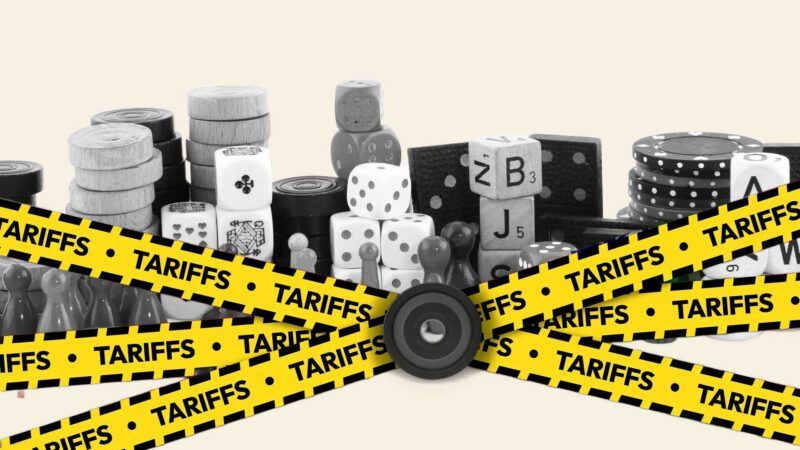Game Night Just Got More Expensive
A $25 board game may soon hit the shelves with a $40 price tag because of tariffs.

On Saturday, a 34 percent tariff on Chinese products went into effect, bringing the total tax rate on Chinese imports to 54 percent. Yet President Donald Trump's trade war might be just beginning: On Monday, the president threatened to levy an additional 50 percent duty on China.
These additional fees will make Trump's already bad trade war even worse. The tabletop gaming industry, which makes board games, cards, and role-playing games, is especially spooked.
"The latest imposition of a 54% tariff on products from China by the administration is dire news for the tabletop industry and the broader US economy," the Gaming Manufacturers Association (GAMA) said in a press release last week. "As an industry highly dependent on producing goods overseas and importing them into the US, this policy will have devastating consequences."
Indeed, China is the dominant force in producing "specialty components like custom dice, injection-molded plastic, and miniatures," Meredith Placko, CEO of Steve Jackson Games, tells Reason. However, it is not the only player. Poland, Germany, and the Czech Republic—all members of the European Union, which faces a 20 percent tariff under Trump—are also key producers of high-quality dice, printing, and wood components. India (26 percent tariff) and Vietnam (46 percent) have also become emerging manufacturers in recent years as companies have looked to diversify their supply chains, according to Placko.
Bolstering domestic production, a stated goal of the president and tariff supporters, is easier said than done, says Placko, who tells Reason that she has looked into building a domestic manufacturing facility in America. "The real challenge is that the United States simply isn't equipped to support full-scale tabletop game production. There are a few domestic shops that can handle cards or small-run printing, but once you move into complex assemblies or high-volume tooling, it becomes prohibitively expensive."
Even if it were as easy as flipping on a switch, ramping up domestic production would not be able to avoid tariffs. Just as auto manufacturing requires sourcing steel, aluminum, and other materials from trading partners, the specialized equipment to make tabletop games—like die cutters, lamination machines, and precision cutting tools—is all sourced overseas. As Jamey Stegmaier, president of Stonemair Games, recently wrote, "Even if a company wanted to invest in the infrastructure to try to make it happen, the short-term losses from the tariffs will eat too deep into their cash to make it possible."
Unable to skirt tariffs, the tabletop gaming industry expects costs to increase. In real terms, a game that cost $3 to manufacture in China last year could now cost close to $5. This means that a $25 board game may soon hit the shelves with a $40 price tag. Stegmaier expects the 2025 holiday season to be "the weakest in years."
Tabletop games are not the only ones to be impacted by Trump's trade war. Last week, Nintendo announced that it was delaying preorders for its Nintendo Switch 2. From 2015 to 2020, the company exited Brazil's markets entirely because of the country's import tax on video games. Nintendo has not yet altered the original June release date of the Switch 2.
As an industry that relies heavily on trade and discretionary income in consumers' budgets, tabletop gaming may be one of the biggest losers in Trump's trade war. With production and distribution costs climbing steadily in the past few years, tariffs are "adding fuel to an already smoldering fire," according to Placko.
Even if Trump doesn't follow through on his threat to add additional duties on China, his tariffs are already hurting American consumers and businesses.


Show Comments (45)